The rarest birds in the world in 2025 are birds you may not have the opportunity to see. The population of these birds remaining in the world will surprise and saddens you. The population mentioned here is the probable number of these birds. You may have wondered, what is/are the rarest birds in the world?
This article lists the rarest birds according to how rare they are. Also, you will see their pictures and videos because you may not have the chance to spot them in their natural habitat or in captivity. There are many factors affecting scantiness. These include habitat loss and their physiological nature like a bird that lays only one egg every two years.
Owing to the fact that they are rare, most of their lifespan is unknown. These birds that are rare are really on the verge of extinction. Most of these rare birds are critically endangered on the IUCN (International Union for Conservation of Nature) red list status.
Here are the top 21 world’s rarest birds 2025 list (with names & pictures), they are,
1. Blue-eyed Ground Dove-World’s rarest bird
2. Madagascar pochard
3. Sulu Hornbill
4. Cerulean Paradise-flycatcher
5. Stresemann’s Bristlefront
6. Bali Starling
7. New Caledonian Owlet-nightjar
8. Orange-bellied Parrot
9. Forest Owlet
10. Black Stilt
11. Kakapo
And 10 more of these beautiful rare birds, keep reading!
21. Golden Pheasant
Population size: Unknown
Threat: Deforestation
Status on IUCN red list: Least concern
Golden Pheasant is a beautiful bird native to Central and western China. They live in the mountainous regions where there are shadow woodlands and forests. The male has bright color plumage while the female look different entirely. The female is a little bit smaller in size than the male.
They feed on seeds, grains, berries, and invertebrates. Their wingspan measures 70cm (27.5 inches) and they have an average weight of 630 grams (1.4Ibs). Their populations are declining due to deforestation. They live on average of about 6 years.
20. Vogelkop Superb Bird-of-Paradise
 |
| Image credit: Avianhybrids |
Population size: Unknown
Threat: Isolation in one region
Status on IUCN red list: Least concern
This bird is now known as its own new species of bird of paradise. The male bird is famous for its courtship dancing moves. The two green dot and the green feathers below makes the bird look like it is smiling while dancing.
The rare bird is found only in New Guinea. It was in 2009, that a national geographical explorer notices the bird because of its unusual vocalization.
In 2016, researchers found that it is a distinct species as it
has a variance to specimens of superb birds in the museum. Like other birds of
paradise, it can also live between 5 to 8 years on average.
19. South Philippine Dwarf Kingfisher
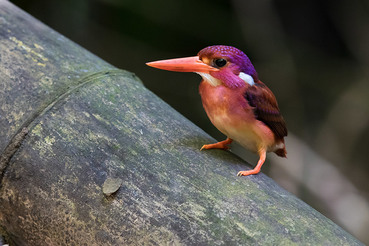 |
| Image credit: MIGUEL DE LEON |
Population size: 2500-10,000
Threat: habitat loss and severe weather
Status on IUCN red list: Vulnerable
The colorful bird can be spotted on in islands of Mindanao and Basilan, in the Philippines. They live in the forest and wetland areas. It is the smallest species of kingfisher.
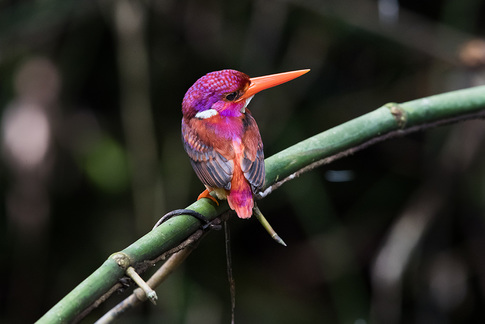 |
| Image credit: MIGUEL DE LEON |
The population trend seems to be decreasing.
For more than 100 years, scientists do not know about them. Thanks to De Leon for the photos. As a rare bird, it has not been photographed before.
18. Kagu
 |
| Image credit: Scott Meyer/Wikimedia Commons |
Population size: Less than 2000
Threat: predators
Status on IUCN red list: endangered
They are small birds that are almost flightless. They have an average size of 55 cm with a weight of 700 to 1100 g. They are also known as forest ghosts.
They are found in New Caledonia Island. They are
highly territorials and are vulnerable to predation. Since they are almost
flightless, dogs, cats, pigs, and other animals feed on them. This bring this bird on the list of the rarest birds in the world 2024.
17. Red-crowned crane
 |
| Image credit: Alastair Rae/Wikimedia Commons |
Population size: 1,830
Threat: habitat loss (shrink of wetland)
Status on IUCN red list: endangered
Red-crowned cranes are omnivorous birds that got their name from the red-bared skin on their head. They often reside in marshes areas where they can catch fish for food. They also feed on small rodents and amphibians.
And it appears they love cold weather. They are tall birds, being the 2nd largest cranes. On average they are 5 feet in size, their wingspan is 2.5 meters (8 feet) and their average weight are 18-21 pounds. They are monogamous in nature; they only have one partner for life.
They are sociable birds, they play, dance, and pair in groups. Due to the efforts of the international crane foundation for its conservation, the population is increasing. They have an incredible lifespan of 15 years.
16. Asia Crested Ibis
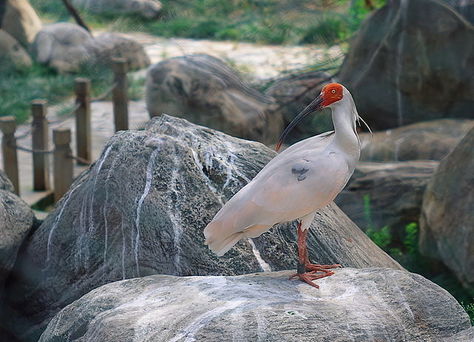 |
| Image credit: Danielinblue/Wikimedia Commons |
Population size: around 500
Threat: Habitat loss and overhunting on its beautiful
feathers
Status on IUCN red list: endangered
Crested Ibis are large beautiful birds whose average size is 56 cm with an average weight of 1kg. They can be found in Russia, Taiwan, China, Japan, and Korea. These birds are widespread through those countries. But sadly, they have disappeared from those areas.
This is a result of overhunting them because of their beautiful feathers. Its feathers in Japan are ornament arrows for samurai warriors. They are almost extinct, it was in the 1980s that just 10 of the birds were seen. No wonder they are rare bird in 2024.
Due to the efforts of captive breeding programs and Crested Ibis Nature Reserve, the birds are gradually increasing. The bird has interesting morphological and physiological characteristics. Both the females and the males have the ability to change their plumage color while breeding.
They do this by producing tar-like substances instead of moulting. They live in the forest on tall trees and wetland regions like freshwater ponds and Rice-paddies. They feed on insects, frogs, small fish, and crabs.
15. Puerto Rican Amazon
 |
| Image credit: U.S. Fish and Wildlife Service, Tom MacKenzie |
Population size: Aaround 500
Threat: Habitat loss
Status on IUCN red list: Critically endangered
These birds are one of the fastest birds. They feed on leaves, fruits, leaves, flowers, and nectar. They are birds that have an average weight of 9.7 oz. (275g) with a length of 11.4 inches (29cm).
Both the female and the male take turn in feeding their chicks. In 1975, it was just 13 remaining in the wild of Puerto Rican amazons. With the conversation efforts, there are about 400 in captivity now.
14. California condor
Population size: Around 300
Threat: Habitat loss, lead poisoning, and slow reproduction
Status on IUCN red list: Critically endangered
California condor is one of the biggest flying birds. They are scavengers like other vultures. From one end to the other of the wings, it measures 10 feet. Because they are rare birds in the world in 2024, it is sacred to Native Americans in the US.
Through the effort put in to revive them on the brink of extinction, the good news is that their population is increasing. From just 10 left in 1987, the birds' number increase to 161 in 1992 and now to about 300.
From fossils record, there are shreds of evidence that the bird once lived in New York and Florida. Now, due to habitat loss, they are only found on rocky cliffs in the central California desserts. Also, ingestion of carcasses that have fragments of lead results in lead poisoning.
Furthermore, their slow reproduction affected their
population. They start to reproduce after they are 6 to 8 years old. In fact, at
the time a female reaches maturity stage, its only lay just 1 egg every 2
years.
13. Great Indian bustard
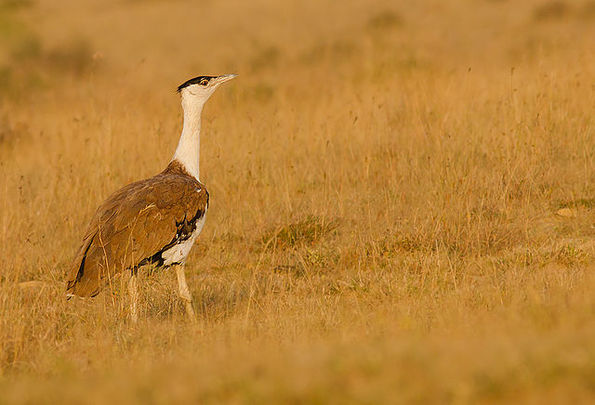 |
| Image credit: Prajwalkm/Wikimedia commons |
Population size: About 250
Threat: Habitat loss, hunting, and poaching
Status on IUCN red list: Critically endangered
It is one of the rare and one of the heaviest birds in the world. They are found in many numbers in Rajasthan, one of the states of India. But now, about 150 birds are found in Rajasthan. They can also be found in Pakistan.
On average, adults weigh around 33 pounds (15kg). And they can be tall as 4 feet (1.2 meters). The females have brown crowns while the males have black plumage on the top of their heads. They prey on small animals such as worms, crickets, and locusts.
These birds faced so many precarious situations because their eggs hardly hatch. For example, their eggs can be trampled on, stolen by animals such as cows and foxes. Their chicks are vulnerable as they are prey to feral dogs and felines.
Moreover, they have lost their habitat to mining activities, and road building. Their foods that are majorly millet and sorghum have been replaced by cotton and sugarcane. All these bring about their decrease in population.
They reproduce from the month of March to September,
but sometimes it can be year-round. The Indian government launches a
conversational program in 2012 to stop the population from decreasing.
Related article
The Top 10 World's Most Dangerous Birds (Attacks and Human Deaths Cause)
12. Northern Bald Ibis
Population size: 240
Threat: Habitat loss, pesticide poisoning, and hunting
Status on IUCN red list: Critically endangered
Northern Bald Ibis are small migrating birds. They do migrate from Morocco to Turkey and Syria. They breed in an open dry land. History shows they were once spread throughout Africa, Middle East, and Europe.
Just 2 pairs can be found in Syria and in Morocco, 100 pairs all as wild colonies. In Syrian, it was thought that it has extinct not until 2002 that one bird was rediscovered again.
This brings about the BirdLife international
to seek the conservation for these birds and organizations such as the Syrian Society
for the conversation of wildlife and Royal Society for the Protection of birds are
all contributing their own parts for the conversation of northern bald ibis.
11. Kakapo
 |
| Image credit: JIDANCHAOMIAN/CC BY-SA 2.0 LICENSE |
Population size: About 147
Threat: Predation (adults, chicks, and eggs)
Status on IUCN red list: critically endangered
This bird is the only flightless parrot. The birds look like owls, though they are actually parrots. They are endemic to New Zealand. Before the bird starts to decrease in population, they are very many in New Zealand.
They were decreasing to the point that it was only 50 of the birds remain in the mid-1990s. It was then intensive conservation efforts began and these increase their number.
They hardly survive predators since they are flightless, so they are very
vulnerable to predation. Kakapo feeds on vegetables only, seeds, roots, fruits,
buds, leaves, and flowers.
10. Black Stilt
 |
| Image credit: SGalla32/Wikimedia common |
Population size: Less than 100
Threat: Habitat loss, predators, and disturbance
Status on IUCN red list: Critically endangered
Black Stilt got its name from the striking black appearance except for its long red legs. In the past, the bird is found throughout New Zealand. But the little population left can now be spotted on in Waitaki Valley, South Island New Zealand.
In 1999, there were just 8 of the birds left in
the wild. But with the help of intensive effort of conservation management, the
bird number has increased.
9. Forest Owlet
 |
| Image credit: Boudhayan Bardhan/Unsplash |
Population size: 70-400
Threat: Habitat loss
Status on IUCN red list: Endangered
The few populations of the forest owlet remaining can be spotted in central India. They are small birds about 23 cm in size on the list of the rarest birds in the world in 2024.
It
was thought to have been extinct but in 1997, it was rediscovered again. In the year 2000, Twenty-five
more of the birds were also found. Sadly, the population is decreasing due to the loss of deciduous forests.
8. Orange-bellied Parrot
 |
| Image credit: JJ Harrison/Wikimedia commons |
Population size: about 50
Threat: diseases, habitat loss, and predators
Status on IUCN red list: critically endangered
This small bird is at risk of extinction in the next 5 years. They are very few in the wild. The bird can be spotted in the western part of the Tasmania coast, Australia.
It is the rarest parrot, among the rarest birds in Australia
and in the world. Some of these birds have been kept in captivity by Zoos
Victoria in an effort to recover the species from extinction.
Related article
67 World's Weirdest Animals (Existing Wonderful Creatures + Pictures)
7. New Caledonian Owlet-nightjar
 |
| Image credit: bird.net.au |
Population size: Less than 50
Threat: Habitat loss and possibly predators
Status on IUCN red list: Critically endangered
Owlet-nightjars are birds that share features similar to Owl and Nightjar. These birds can only be spotted in New Caledonian Islands. This species is bigger and has longer legs than others. There is little information about this bird.
The possibility of this bird exhibiting the same habits as other species of Owlet-nightjar is very high. Other species of Owlet-nightjar hunt on small animals like millipedes and spiders and they are territorials. But the long legs in New Caledonian Owlet-nightjar suggest its rummaging on ground level.
This bird really does dodge birdwatchers and researchers because
it is unknown until 1998. That was when a single one was sighted. Sadly, they
are decreasing in population. This is because this species is very rare and the
conversation is difficult.
6. Bali Starling
Population size: Less than 50
Threat: Excessive hunting (cage bird trade)
Status on IUCN red list: Critically endangered
Bali starlings are small beautiful white birds with an average weight of 850g, a wingspan of 54cm and they are 25 cm in length. They live in a forest with many trees. You may be fortunate to spot this bird in Bali, an Island in Indonesia.
Their population is decline drastically due to illegal
trapping, they almost extinct. There have been conservation programs for this
bird to revert it from the brink of extinction. They feed on insects and plants
such as seeds and fruits.
5. Stresemann’s Bristlefront
 |
| Image credit: abcbirds.org |
Population size: Less than 50
Threat: Hunting
Status on IUCN red list: Critically endangered
The bird got its name from the stiff feathers it has, which protrudes from both sides of its head. The function of its stiff feathers is unknown. They are found in South America.
It is unknown to many ornithologists
until 1995 that one of the birds was sighted. Then in 2010, a few populations were
also sighted in Bahai State, Brazil. They feed on arthropods, as they have been
seen searching through litter's leaves.
4. Cerulean Paradise-flycatcher
 |
| Image credit: speciesonthebrink.org/ |
Population size: 34-150
Threat: Habitat loss, climate change
Status on IUCN red list: Critically endangered
The bird can be spotted on Sangihe Island in Indonesia. For a century, the bird was thought to be extinct. It was known through specimen because it is one of the rarest birds in the world.
When the bird was learned about in
2001, more than 21 birds were discovered and since that time its population has
managed to increase.
3. Sulu Hornbill
 |
| Image credit: pressreader.com |
Population size: around 27
Threat: Hunting
Status on IUCN red list: Critically endangered
The bird can be spotted in 3 Islands in the Philippines, Tawi-Tawi,
Jolo, and Sanga Sanga. Their hornbills look heavy but it actually lights. It is
made of thin, hollow bone cells. The female likes to nest in tall trees. There
is no much information as regards their ecology.
2. Madagascar Pochard
 |
| Image credit: Frank Vassen/Wikimedia commons |
Population size: about 25
Threat: habitat loss (pollution)
Status on IUCN red list: Critically endangered.
Madagascar Pochard is a bird that looks like a duck. It is the second rarest bird in the world. It was believed to be wiped out completely for over a decade. It was discovered on a single lake. Due to pollution, poor agricultural practices, sedimentation, all these make the bird hardly survive.
The little population of the bird that left was forced to live in new areas where there are no effects of pollution. There are programs that are putting in efforts in helping the population of the birds to increase. By solving the issues that are driving the birds away.
1. Blue-eyed Ground Doves-World’s rarest birds
 |
| Image credit: Save Brasil/cepfcerrado.iieb.org.br |
Population size: 12
Threat: Habitat loss (Wildfire)
Status on IUCN red list: Critically endangered
In 2015, it was the thought that the blue-eyed ground dove has been extinct. As it has not been sighted for over 75 years, 1941 was the last year it was seen. It was ornithologist Rafael Bessa that spots the bird while singing.
After that, researchers found that there are about just 6 pairs of the bird left. Since the bird is very rare, they could not be captured. The birds live in the area of cerrado in 1941. Presently, they are found in cerrado private land.
It was because the
Brazillian cerrado’s massive destruction really threatens the lives of
these birds. The local NGO, Instituto Grande Sertao has been working to convert
the area to a protected park.
Over to you, what do you think about these rarest birds in
the world in 2024? We will like to hear from you in the comment section (post a
comment). Please subscribe to our mailing lists and share this article. Thank you!
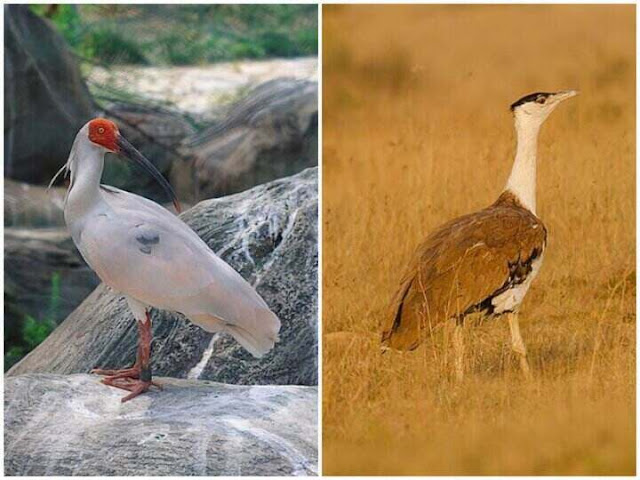




Post a Comment